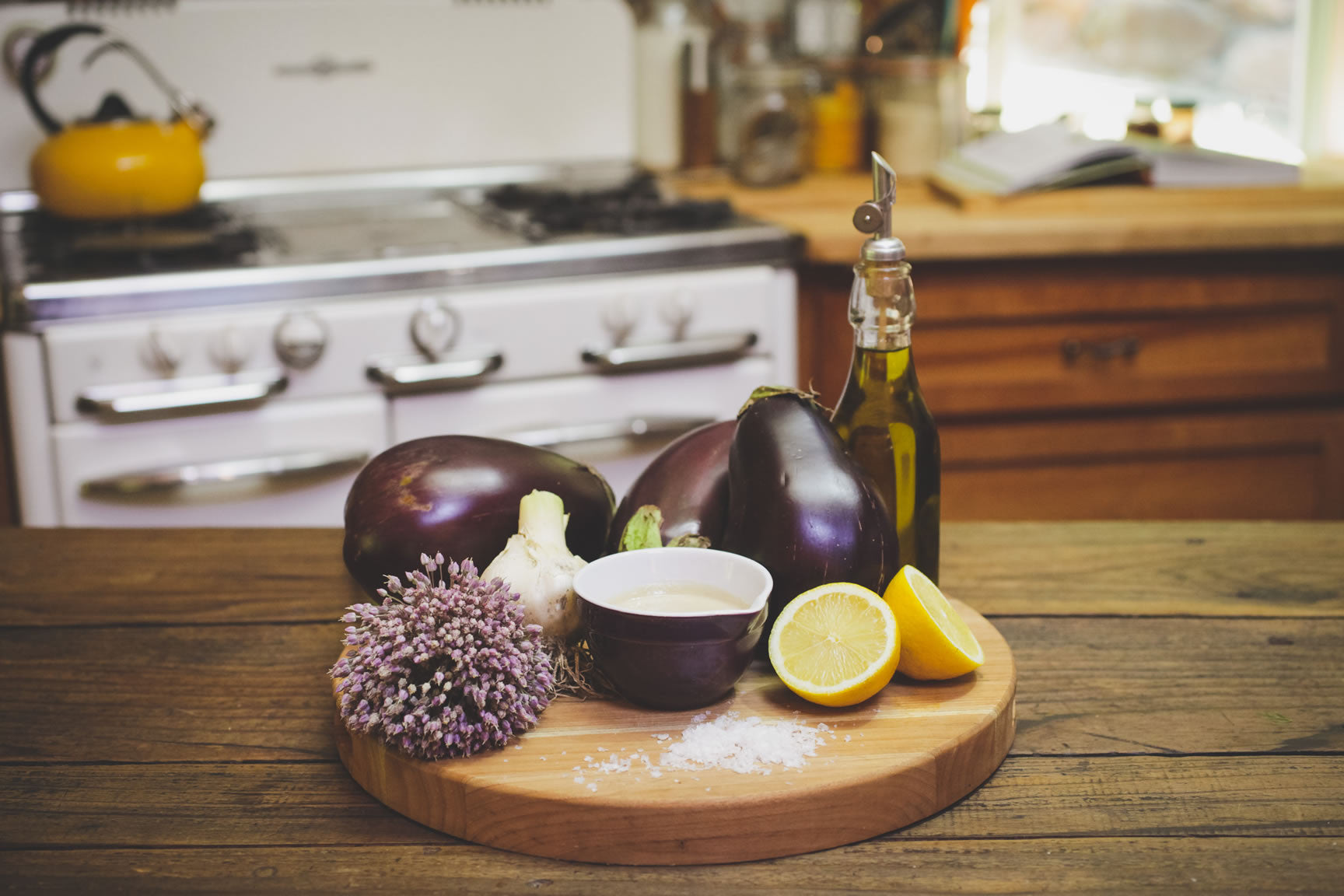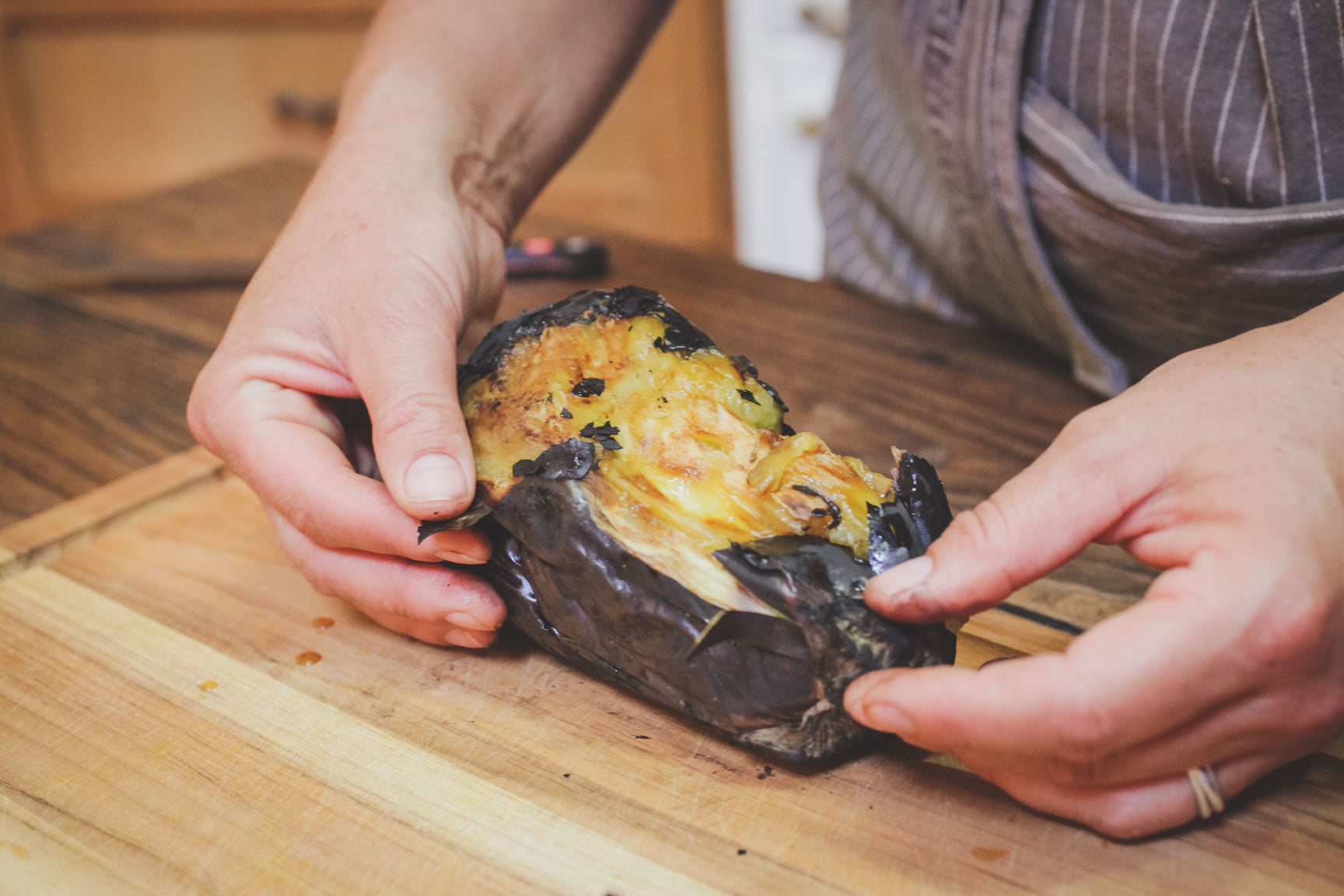- Continue Shopping
- Your Cart is Empty
Baba Ganoush: Smokey Eggplant Dip

What You'll Need
Equipment
- grill or grill pan
- high speed blender or food processor
- measuring cups and spoons
Ingredients
- 3 medium-large eggplants
- 1/2 cup tahini
- 1/4 cup olive oil, plus more for drizzling
- 2 cloves garlic, crushed
- 2 tablespoons lemon juice
- 1 1/2 teaspoons salt
Baba Ganoush, Ghanouj, Ghanoush, Gannuj, Gannouge, Ganoosh
An eggplant by any other name might charm us less than thee. However it may be spelled, the history of baba ganoush has a spicy history that belies it’s pale, creamy appearance. It comes from the Arabic phrase baba gannuj, in which baba can mean father or daddy (or an endearment), and gannuj can mean spoiled, coquettish or pampered. The dish may have been named with reference to its supposed invention by a 'coquettish’ member of a harem for a sultan. Alternatively, it may be that the smooth, yet sumptuous dish was prepared for an aged, perhaps toothless patriarch, a ‘spoiled daddy.’
We’re gardeners and cooks, down here at the Feed and Farm, and not students of linguistics, but it is fascinating to consider the stories imbedded in the foods we eat. This is an ancient dish, best cooked over an open flame, and only made smoother by the invention of the blender. You can taste the smoke, and the history, the oil and the crushed seeds and the garlic, and a hint of mystery at the heart of this elegant dish.
It’s also a rare look into the anatomy of an eggplant. Usually we slice it in rounds, so the seeds appear as mere beige speckles, dispersed throughout the vegetable. However, roasting and handling it whole lets you appreciate how the seeds are actually arranged inside the plant, a rare, and dare we say, sexy peek into the secret heart of an eggplant.
 Tend the eggplants carefully, turning them often so that the char is spread evenly over the surface of the skin. Cook them until they are black all over, and soft enough that tongs can easily tear the tender skin.
Tend the eggplants carefully, turning them often so that the char is spread evenly over the surface of the skin. Cook them until they are black all over, and soft enough that tongs can easily tear the tender skin.
When they are good and black and soft all over, place them into a Dutch Oven or other heavy, lidded pot and cover tightly. The eggplants will continue to cook and sweat in the heat generated from charring. After about half an hour in the enclosed pot, the eggplants should be cooked through, somewhat cooled, and ready for further processing.
 Rub the blackened skin off with your hands and discard.
Rub the blackened skin off with your hands and discard.

Cut the eggplants open lengthwise, and pull the seedy paddles from the heart of the fruit to remove the seeds. (A few stray seeds are no big deal, but try to get most of ‘em; the seeds contain all the bitterness. Young eggplants can be used whole, without de-seeding, but if the seeds are brown and mature, you’ll want to remove as many as you can.)
Rough chop the eggplant, and place in a blender or food processor with the remaining ingredients; process till a smooth, creamy consistency is reached. If the consistency seems too thick, add some of the smoky liquid that no doubt seeped from them in the sweating process. Taste and add more salt or lemon juice, if necessary.( Hot tip: That smoky liquid also makes an awesome base for salad dressings, or can be added to soups or cooked veg or legumes.)
 Garnish the ganoush with a drizzle of olive oil and/or fresh herbs and serve with flatbread, crackers, fresh vegetables.
Garnish the ganoush with a drizzle of olive oil and/or fresh herbs and serve with flatbread, crackers, fresh vegetables.

An eggplant by any other name might charm us less than thee. However it may be spelled, the history of baba ganoush has a spicy history that belies it’s pale, creamy appearance. It comes from the Arabic phrase baba gannuj, in which baba can mean father or daddy (or an endearment), and gannuj can mean spoiled, coquettish or pampered. The dish may have been named with reference to its supposed invention by a 'coquettish’ member of a harem for a sultan. Alternatively, it may be that the smooth, yet sumptuous dish was prepared for an aged, perhaps toothless patriarch, a ‘spoiled daddy.’
We’re gardeners and cooks, down here at the Feed and Farm, and not students of linguistics, but it is fascinating to consider the stories imbedded in the foods we eat. This is an ancient dish, best cooked over an open flame, and only made smoother by the invention of the blender. You can taste the smoke, and the history, the oil and the crushed seeds and the garlic, and a hint of mystery at the heart of this elegant dish.
It’s also a rare look into the anatomy of an eggplant. Usually we slice it in rounds, so the seeds appear as mere beige speckles, dispersed throughout the vegetable. However, roasting and handling it whole lets you appreciate how the seeds are actually arranged inside the plant, a rare, and dare we say, sexy peek into the secret heart of an eggplant.
Directions
Place 3 whole eggplants directly over an open flame, ideally on a grill, over a blazing wood fire. This is a good way to take advantage of the hot flames that lick up as you are burning wood down to coals for a barbecue. You can also make use of a gas burner on high, and put the vegetables directly over the open flame. Tend the eggplants carefully, turning them often so that the char is spread evenly over the surface of the skin. Cook them until they are black all over, and soft enough that tongs can easily tear the tender skin.
Tend the eggplants carefully, turning them often so that the char is spread evenly over the surface of the skin. Cook them until they are black all over, and soft enough that tongs can easily tear the tender skin. When they are good and black and soft all over, place them into a Dutch Oven or other heavy, lidded pot and cover tightly. The eggplants will continue to cook and sweat in the heat generated from charring. After about half an hour in the enclosed pot, the eggplants should be cooked through, somewhat cooled, and ready for further processing.
 Rub the blackened skin off with your hands and discard.
Rub the blackened skin off with your hands and discard.
Cut the eggplants open lengthwise, and pull the seedy paddles from the heart of the fruit to remove the seeds. (A few stray seeds are no big deal, but try to get most of ‘em; the seeds contain all the bitterness. Young eggplants can be used whole, without de-seeding, but if the seeds are brown and mature, you’ll want to remove as many as you can.)
Rough chop the eggplant, and place in a blender or food processor with the remaining ingredients; process till a smooth, creamy consistency is reached. If the consistency seems too thick, add some of the smoky liquid that no doubt seeped from them in the sweating process. Taste and add more salt or lemon juice, if necessary.( Hot tip: That smoky liquid also makes an awesome base for salad dressings, or can be added to soups or cooked veg or legumes.)
 Garnish the ganoush with a drizzle of olive oil and/or fresh herbs and serve with flatbread, crackers, fresh vegetables.
Garnish the ganoush with a drizzle of olive oil and/or fresh herbs and serve with flatbread, crackers, fresh vegetables.
Over to You
It’s part of our mission here at Mountain Feed to help you make delicious, sustainable, homemade food more often. Stop by and say hello on Facebook, Twitter, Instagram or Pinterest. Or, as always, you can do it the old fashioned way and come by the store to speak with one of our in-house experts.
